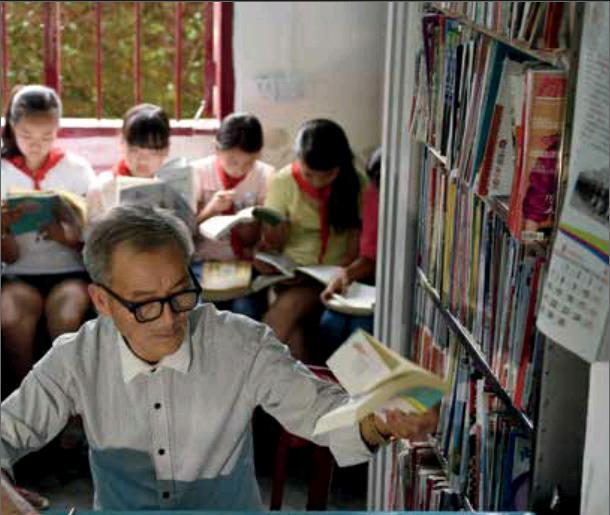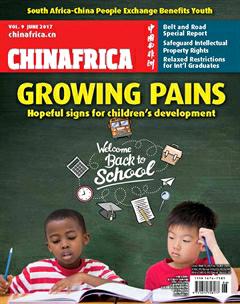Turning a New Page
By+Liu+Jian

Duan Chun is probably Chinas, if not the worlds, oldest librarian. The 96-year-old man has dedicated a significant part of his life and relentless efforts to promoting literacy and reading in a small rural village in central-south China.
In 1985, Duan, together with seven other cofounders, raised money and established the Haoshan Library in Haoshan Village of Anren County, in Hunan Province. Since then, the number of books in the library has increased from 5,300 to 53,000, so far helping a total of 152 students to go on to pursue higher education. This is a high number for a 2,000-strong village.
“The library was founded to promote reading in our village by providing villagers easy access to books,” said Duan. Inspired by the hard work of the original eight co-founders, more villagers have joined their team, and the library has now over 40 volunteer librarians, said Duan.
Tan Xianggui, who grew up in Haoshan Village and now teaches at Hunan University, says he greatly benefited from the library. “Duan and the library opened the door of knowledge to me, a child growing up in a rural environment lacking cultural facilities,”he said. “Reading in the small library is one of my fondest childhood memories. Reading has changed my life.”
In Hunan alone, there are over 40,000 village libraries, which have gained broad support from all segments of society. As part of the 2017 China Reading Campaign, launched in Hunan Provinces capital city of Changsha, on April 19, Chinese companies donated a total of 300,000 books to similar libraries across Hunan.
Growing reading culture
Much like village libraries, new channels to access reading materials have kept popping up and have become popular among the Chinese readership in recent years, from traditional paper books to book excerpts on TV shows, and from social media apps to “kindling.”
Recently, the Chinese TV program Readers has been a hit since its debut on China Central Television(CCTV) on February 18. The weekly talk show invites people from all walks of life to read aloud excerpts of poems, essays and books they like or wrote.
Airing over the weekend, the show has sparked fresh enthusiasm for literature, in part because of the high-profile guest readers including Chinas first astronaut Yang Liwei and movie director Xu Jinglei. “All the readers are well-known in their own fields, but the show brings out their emotional side,” said hostess Dong Qing.
“I am moved to tears at every episode of this program. I like the words, the emotion and the recitation. Every aspect of it is beautiful,” reads an online comment on the show.
Convenient services
The popular TV program is only a part of the efforts encouraging people to read. As a self-described “bookworm,” it is no wonder that Li Wei, a 32-year-old worker in Beijing, was excited when she found a 24-hour automated library near her office building in March last year.
“Its as convenient as an ATM. Now, I do not need to go out of my way to visit traditional libraries,” she told ChinAfrica. In the past year, she has borrowed more than five books every month from the streetside mini library that offers more than 400 books.
The 24-hour urban library program was launched by the Capital Library of China and district-level libraries under the guidance of Beijing Municipal Bureau of Culture in 2011. Readers need to apply for a membership card before borrowing books from the automated library, which works in the same way as a vending machine. Books can be returned to any of these machines.
Over the past six years, the number of automated street libraries has exceeded 150 across Beijing, and similar facilities have mushroomed in many other cities across the country.
“The 24-hour street libraries play a complementary role to traditional libraries, making books more accessible to as many communities as possible,” said Ma Jun, Deputy Director of Chaoyang District Committee of Culture of Beijing.
Guiding reading habits
In a digital age, parents continue to value printed books for their kids. Despite parents adopting new reading habits for themselves on electronic devices, data show that printed books remain the most used medium when it comes to their children.
On the International Childrens Book Day on April 2, Yang Ling, 35, bought her seven-year-old daughter Hans Christian Andersens Complete Fairy Tales as a gift. “I like buying printed books for my daughter, and hope that she can discover the joy of reading, instead of spending time gawking at digital gadgets,” she told ChinAfrica.
Over the past decade, the number of childrens books published in China has been increasing, growing 26 percent last year, according to statistics recently released from the 14th Shanghai Education Expo held on April 7-9.
“Compared with superficial digital reading, paper books can bring children joy, while in-depth reading can help cultivate their critical thinking,” said Wang Zhong, President of Zhejiang Juvenile and Childrens Publishing House, who believes paper books are indispensable for childrens growth.
“I dont recommend children to spend too much time on digital reading, as its tendency to distract attention is not beneficial to shaping their good reading habits,” echoed Professor Wang Yuguang at Peking Universitys Department of Information Management.“Reading on paper enables students to read without any interruptions, and they can read and think at the same time,” he added.
Complementary roles
With smartphones and e-readers becoming more common, some worry that the days of paper books could be numbered. But as a recent survey shows, traditional print books are still popular among Chinese readers.
On average, each Chinese read 7.86 books last year, including 4.65 printed books and 3.21 e-books, according to the 14th National Reading Survey released by Chinese Academy of Press and Publication(CAPP) in April.
This nationwide survey, covering 52 cities across China, showed that Chinese still preferred printed books to e-books, with 51.6 percent of the respondents saying they preferred to “hold a printed book”in their hands to reading on mobile phones (33.8 percent), on computers (9.8 percent), and via e-book readers (3.8 percent).
Xu Shengguo, Director of CAPPs National Reading Research and Promotion Center, believes going back to printed books is a worldwide trend visible in many countries such as the United States, the UK and France.
“Although digital reading is quick and convenient, its only suitable for fragmented reading practices, while reading printed books is conducive to in-depth reading,” Xu said, adding that childrens stories, academic reports and classic literature should still be read on paper.
Xu believes printed books are here to stay, not only because of the need for richer information, but also because many still value the tactile sensation of a bound paper book.
“Paper books are well designed, they look and smell good, and they carry with them a more human touch,” said Li, echoing the feelings of many book lovers around the world.

